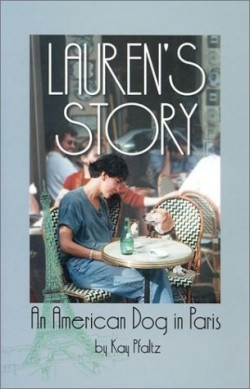Lauren's Story
An American Dog in Paris
Lauren, a young, starving beagle, matures into a cosmopolitan dog that takes on Paris from its cafés and cinemas to its gardens and salons. She is also the center of a small group of well-defined, fully individuated characters. There are Americans-the author’s family members and friends in the horse country of Virginia. Then there are the French-the aging Comtesse de Fougereaux, a former stag hunter who is now a patron of the arts; Roland, “the dreadfully smelly man” the ringleader of all the clochards (the tramps who haunt the cafés); and expatriates.
The descriptive passages are so detailed and evocative of scene, that at times it seems as if the Parisian setting becomes a character itself. Well educated in both American and English universities, Pfaltz has written in other genres, including a guidebook of Paris. Aptly, Lauren’s Story includes an appendix, “Some of Lauren’s Favorite Haunts.” Readers who travel to France might find its use intelligent fun.
Readers who love art, music, literature, history, and obviously animals will enjoy vicariously traveling with Pfaltz and Lauren. Their excursions are full of historic places and notable people, engaging and usually stimulating to readers.
Unconditional love is the recurring theme of this book, whether it is between narrator and dog or, more broadly, dog and humanity. Of animals, Pfaltz writes, “they are blind to our prejudices. Lauren gave the simple old man the love and physical contact he probably hadn’t had in who knows how long. For one moment she gave him love and acceptance, and I think his tears were because of her and his overwhelming emotion, not failing tear ducts.”
If at times if the author is too close to her dog, as when they share a peach (“I took a bite; she took a bite.”), she may be forgiven. Her experience with affection supports her point: “Love endures” love of a higher power; love of nature, love of mother, father, son or daughter. Our love for animals lasts because it’s less complex and more pure. “I smile to myself, no, they don’t often leave us for someone else.”
Reflective passages are well integrated into episodes of romance, travel, and health crises; further, they are inspirational and pertinent to the theme. Though poignant, the book is not sad, but heartening.
Disclosure: This article is not an endorsement, but a review. The publisher of this book provided free copies of the book to have their book reviewed by a professional reviewer. No fee was paid by the publisher for this review. Foreword Reviews only recommends books that we love. Foreword Magazine, Inc. is disclosing this in accordance with the Federal Trade Commission’s 16 CFR, Part 255.

